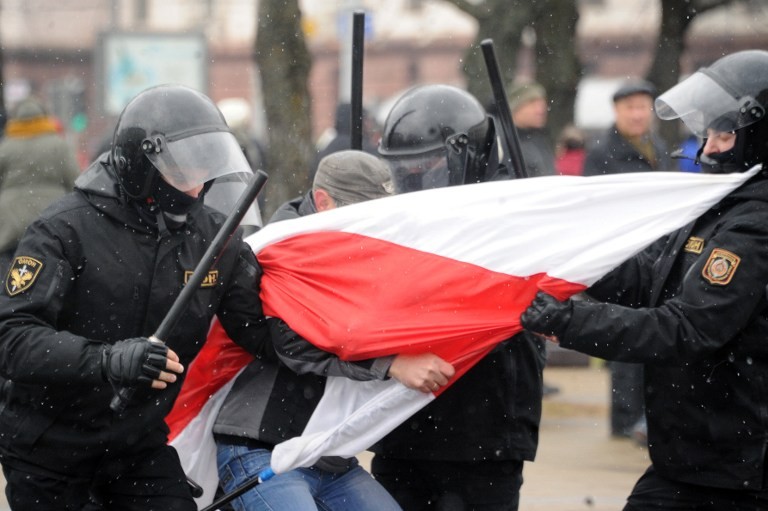JUDY WOODRUFF: In Belarus, tens of thousands marched through the capital of Minsk today, angered over a disputed election and the brutal police crackdown that followed. Police have freed about 2,000 people arrested during this week's demonstrations. But reports of widespread torture of those in custody are driving fresh outrage. All this as the European Union is drafting a list of people in Belarus who could face sanctions for their role in the crisis. Nick Schifrin has our story. And a warning: Some of the images are graphic. You may find them disturbing.
NICK SCHIFRIN: The scars of authoritarian rule are written on Vartan Grigoryan's back and in the stitches holding together his eye.
VARTAN GRIGORYAN, Minsk Resident (through translator): I was told to lie down, and so I did. They started beating me. I did not resist. They took me to a police truck, and beat me there as well.
NICK SCHIFRIN: He was in a group of men released from a detention facility that included 19-year-old Alexander Vilks in the green jacket. That's his mother. He'd been held for two days without any communication. And when he shows her the wounds inflicted inside? She can't bear it.
ALEXANDER VILKS, Minsk Student (through translator): They treated us as if we were terrorists. They beat us very badly, mostly hitting our legs, but also across the body.
HANNA LIUBAKOVA, Outriders: This was some darkest days in the history of modern Belarus.
NICK SCHIFRIN: Hanna Liubakova is a journalist for the independent site Outriders.
HANNA LIUBAKOVA: Whenever a person was transported from one place to another, that person was beaten. There were 80 people that were held there for 24 hours, without food, without water, and, basically, they could not sleep.

NICK SCHIFRIN: Since Sunday, authorities have cracked down on massive protests that followed what they call an election stolen by Alexander Lukashenko, known as Europe's last dictator. The demonstrations are the largest since independence 30 years ago. When one protest of 10,000 reached a government building today, soldiers laid down their shields. Belarus' top security official apologized to beaten protesters. And, today, the protests expanded to workers at state-owned factories, the backbone of the Belarusian economy. They organized a general strike. These workers were asked to raise their hand if they voted for Lukashenko, or for opposition candidate Sviatlana Tsikhanouskaya.
HANNA LIUBAKOVA: Those who were not interested in politics have suddenly understood the nature of this government, of this president. Those who were not against Lukashenko are now taking another side because of this police brutality, of this police violence.
NICK SCHIFRIN: Today, Tsikhanouskaya offered a way forward.
SVIATLANA TSIKHANOUSKAYA, Belarusian Opposition Leader (through translator): I call on the authorities to end this and enter a dialogue. I ask the mayors of all cities to organize peaceful mass rallies.
NICK SCHIFRIN: But this is still Lukashenko's regime.
MARISA DURHAM, Graduate Student: So, they put me on the ground. They put a sheet over my head, so I really couldn't see what was happening.
NICK SCHIFRIN: Marisa Durham is an American master's student, whose boyfriend, Stas Gorelik, is Belarusian who has been studying in the States. They weren't protesting, but police forcibly entered their apartment two days ago and took him away.
MARISA DURHAM: Stas always did everything in his -- everything to always make sure that I was safe, no matter what. And he always took care of me. And he always knew. And the most that I want to do right now try to protect him and help him.
NICK SCHIFRIN: Late tonight, her fear was eased. After our interview, Stas was released. And 26 years later, a president's grip on power is getting weaker. For the PBS NewsHour, I'm Nick Schifrin.













